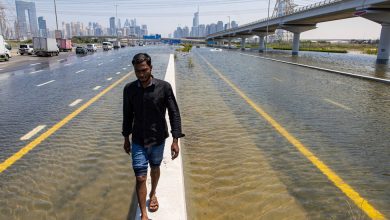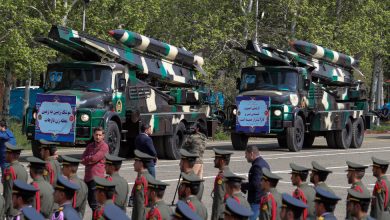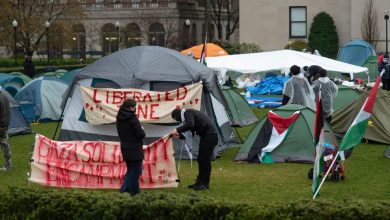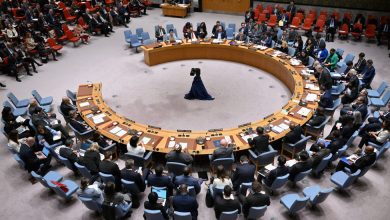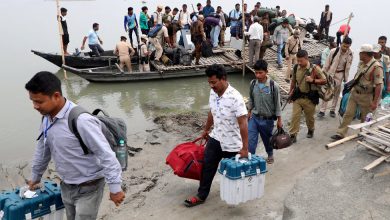Your Tuesday Briefing
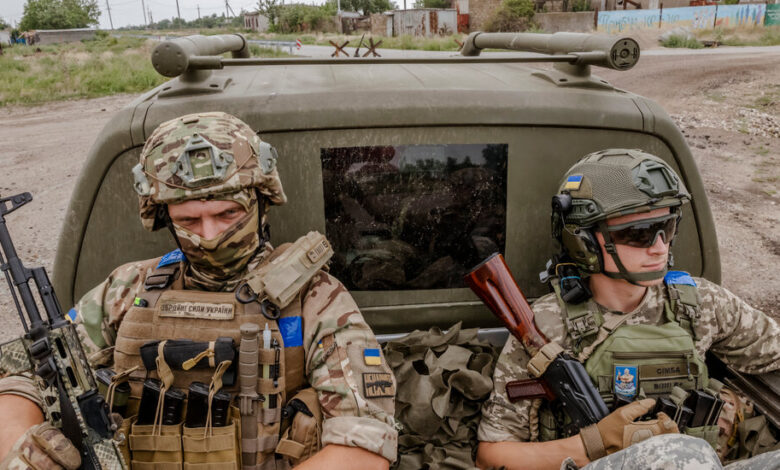

Ukrainian soldiers riding back from near the Kherson front line.Credit…Daniel Berehulak for The New York Times
Ukraine bolsters its counteroffensive
Ukrainian forces launched ground assaults yesterday in multiple areas along the front in the Kherson region of southern Ukraine, apparently stepping up a counteroffensive aimed at recapturing territory seized by Russia.
Fighting along a swath of the front line escalated sharply, according to Ukrainian officials. Kyiv said that its military had “breached the occupiers’ first line of defense near Kherson,” as part of a multipronged advance.
The reports of intensifying fighting came as U.N. nuclear experts prepared to visit the Zaporizhzhia Nuclear Power Plant, which lies to the north of Kherson. The inspectors will arrive this week, tomorrow at the earliest.
Details: Artillery strikes near the Russia-controlled plant, which is Europe’s largest nuclear facility, have raised fears of a meltdown.
Context: For months, Ukrainian officials have promised a broad counteroffensive in the Kherson region to push Russian forces from the western bank of the Dnipro River, a natural barrier. It was unclear if the fighting yesterday was the start of that larger effort.
In other updates:
-
Ukraine also claimed to have destroyed a large Russian military base behind Russian lines in the Kherson region. It was not possible to immediately verify the claims.
-
Ukraine’s railroads are offering vital connection now that skies and ports are closed.
Political chaos grips Iraq
Iraq’s political chaos deepened yesterday after Muqtada al-Sadr, a powerful Shiite cleric, said he was retiring from politics.
In response, protesters supporting Sadr took to the streets of Baghdad and breached barriers in the so-called Green Zone — the area around Parliament, Iraqi government offices and diplomatic missions. At least 12 people were killed when the security forces opened fire.
Sadr’s announcement could mark a more dangerous phase of Iraqi turmoil, and it raised fears that his followers would increasingly turn to street protests. Baghdad and most provinces were under curfew by yesterday evening.
The State of the War
- What Is Next?: After six months of fighting, the war seems to have settled into an impasse on the battlefield. Here is how the next stage of the war might shape up.
- Nuclear Plant Standoff: As renewed shelling intensified fears about a nuclear accident at the Zaporizhzhia power plant, the United Nations neared a plan to send inspectors to the Russian-controlled station.
- Russia’s Military Expansion: President Vladimir V. Putin ordered a sharp increase in the size of Russia’s armed forces, a sign that he expects a prolonged war — an outcome Ukraine has incentive to avoid.
- Women in the War: Ukrainian women have become an all-important force in the fight as they confront long-held stereotypes about their role in the country’s post-Soviet society.
It could also deepen a political stalemate: Iraq hasn’t had a new government since candidates loyal to Sadr won the biggest bloc of seats last October. In June, he ordered the new lawmakers to resign. His followers then set up a tent camp that has blockaded Parliament for more than a month, preventing lawmakers from meeting.
Analysis: The cleric has said he was leaving politics before, prompting questions about whether this could be a tactic to gain the upper hand in future negotiations to form a government.
Europe tries to deal with drought
Europe is confronting one its worst droughts in decades: Nearly 65 percent of E.U. territory is currently under some degree of drought warning, according to one estimate.
Rivers are running low, paralyzing commerce and causing disruptions for companies that transport goods and commodities like oil and coal. The drought has also exposed the carcasses of World War II ships and disrupted European river cruises.
As droughts become more frequent, Britain is looking to reprocess its sewage into drinking water in the future. The head of Britain’s Environment Agency said that people would need to be “less squeamish” about the idea.
Analysis: Climate change will make extreme weather — like droughts, hurricanes and other large storms — more frequent and intense.
Context: Toilet-to-tap recycling is already in place in Australia, Singapore, Namibia and parts of the U.S. It’s cheaper than desalination and can be used in inland areas.
THE LATEST NEWS
Europe
-
Air France is under scrutiny after a series of incidents raised concerns about safety. In June, for instance, two pilots got into a fight in the cockpit. They were suspended.
-
Emmanuel Macron, France’s president, has returned from a three-day visit to Algeria. He is trying to reshape a fraught relationship and account for historical wrongs.
Around the World
-
NASA delayed its launch of a moon rocket yesterday after discovering engine problems shortly before liftoff.
-
In China, 28 people were charged months after video circulated of men beating women in a restaurant. The attack prompted outraged discussion about misogyny, but the government has tried to change the topic to gangs.
-
Angola’s ruling party eked out a win yesterday, though it was its weakest showing in five elections, as young people turned away.
What Else Is Happening
-
Serena Williams won her first match at the U.S. Open.
-
Taiwan is caught in a geopolitical game over its semiconductor industry. China’s push to compete in the sector may not be going as well as Xi Jinping hoped.
-
Taylor Swift is planning to release a new album, “

